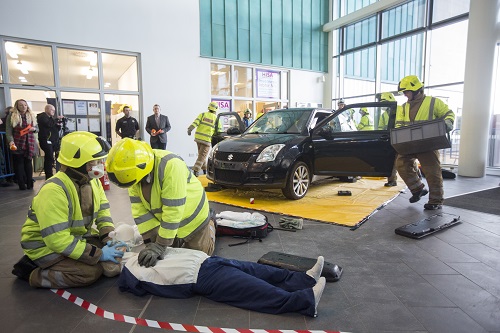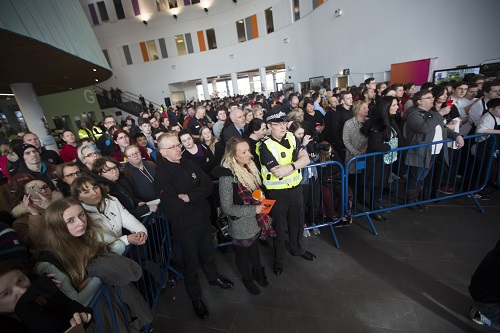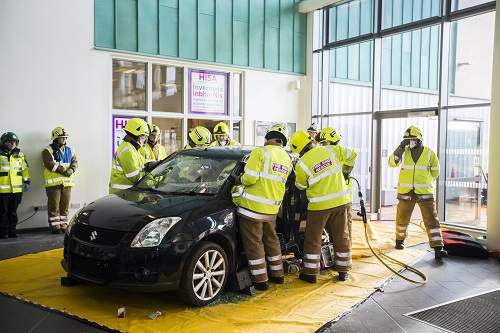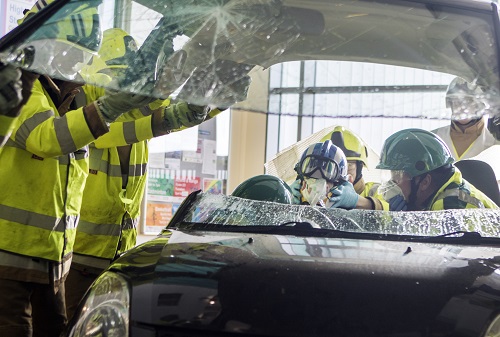Inverness College UHI presents Arrive Alive
Students at Inverness College UHI will find out what’s involved in the immediate aftermath of a road traffic collision as part of an initiative to reduce the number of young deaths on Highland roads.
 Inverness College UHI has teamed up with the Scottish Fire and Rescue Service to stage Arrive Alive – a road safety event designed to educate and raise awareness of antisocial driver behaviour, the role passengers can play in preventing a road accident occurring by speaking out, and the effects of antisocial driver behaviour on family, friends and the wider community.
Inverness College UHI has teamed up with the Scottish Fire and Rescue Service to stage Arrive Alive – a road safety event designed to educate and raise awareness of antisocial driver behaviour, the role passengers can play in preventing a road accident occurring by speaking out, and the effects of antisocial driver behaviour on family, friends and the wider community.
A live demonstration, complete with real car, will show the scene met by emergency responders attending a road traffic collision and how all the emergency services work together to save lives.
Analysis of road traffic collision statistics (2012-2016) for the Highland Council area reveal 27 per cent of fatal road accidents and 25 per cent of serious road accidents involved a young driver (17-25). In 2016, 18 road traffic collisions involved young drivers, while the number of young casualties fatally or seriously injured was 25.
Arrive Alive takes place in the Atrium at Inverness College UHI at 12pm on Friday 16th February and follows concerns about young driver behaviour in the Highlands and challenges in the university’s own car parks at Inverness Campus.

A car will be placed in the Atrium and students will
watch as Police Scotland, the Scottish Fire and Rescue Service and Scottish Ambulance Service re-enact their response to a ‘live’ staged road traffic collision involving a trapped casualty, played by Highlands and Islands Students’ Association Inverness president Gabbi Starr.
Dan and Grace, MFR breakfast show presenters, will interview the emergency services during the exercise to highlight examples of antisocial driver behaviour, including using mobile phones, driving too fast, or being distracted, and what passengers can do if they feel uncomfortable.
The live demonstration will be followed by a short presentation by Debbie Gilham, the mother of former Culloden Academy pupil Georgia, who lost her life, aged 16, in a road traffic collision near Croy in March 2016. She will highlight the consequences of a road traffic collision and how they affect the families of those involved.
Afterwards, students, including secondary school pupils who attend on a Friday as part of our Vocational Pathways Programme, will be able to speak to professionals from the Scottish Fire and Rescue Service, Police Scotland, the Scottish Ambulance Service, the Road Safety Team at Highland Council and the Institute of Advanced Motorists, who will host interactive stands including virtual reality headsets simulating a road traffic collision, reaction testers and drink-drive breathalysers. The ambulance service will also be showing students CPR training.
 The re-enactment will be filmed by students studying NC Media on behalf of the Scottish Fire and Rescue Service, who want to roll-out the campaign to schools and colleges in the Highlands. The students have been receiving mentoring support from Ian Forsyth, from System2, on the project. Students studying BA (Hons) Visual Communication and Design are also working on new branding for the fire service campaign.
The re-enactment will be filmed by students studying NC Media on behalf of the Scottish Fire and Rescue Service, who want to roll-out the campaign to schools and colleges in the Highlands. The students have been receiving mentoring support from Ian Forsyth, from System2, on the project. Students studying BA (Hons) Visual Communication and Design are also working on new branding for the fire service campaign.
Dougie Campbell, station manager at the Scottish Fire and Rescue Service, said: “The Scottish Fire and Rescue Service is committed to working with our partners to reduce the number of serious and fatal road traffic collisions on Highland roads. This event will highlight the devastating consequences when young people are involved in this type of collision and will encourage attendees to be ‘inclusive’ in relation to the road safety message. We aim to encourage young people to discuss, challenge and influence unacceptable driving styles in themselves, family members and their peers, ensuring our roads will become safer in the future for all that use them.”
Professor Chris O’Neil, Principal of Inverness College UHI, said: “As a college and university, we have a duty of care to our students and sadly, we believe it necessary to partner with the emergency services in raising awareness of the risks and responsibilities associated with driving. The statistics on collisions involving young drivers make difficult reading. Responsibility comes with a driving licence. I need to force the message that any form of antisocial behaviour that involves the use of a car, be it aggressive driving in our car park or using the phone on the open road, is not acceptable. One cannot even begin to imagine the unbearable loss of losing a loved one in such a tragic way. By highlighting poor driver behaviour and the consequences of such behaviour in such a hard-hitting way, I hope we play some part in making everyone – not just young people – think twice about their behaviour behind the wheel and help reduce the number of deaths on our roads, which frankly are far too many.”
 Debbie Gilham added: “Many of Georgia’s friends now study at the University of the Highlands and Islands and I wanted to show them the devastation a split second mistake, or lack of concentration, can have, not just on those involved, but families, friends and the wider community. The last thing my daughter said to me was ‘I won’t be here when you get back,’ and she wasn’t. We all think it will never happen to us. We read stories in the paper or see something on the news and think, ‘that poor family,’ and then we go on with our lives. But sadly it does happen to people we know. I don’t live my life now, I just endure it. The sadness, the pain and the guilt are with me every minute of every day and I don’t want to see anyone go through that. I want people to think about their driving, think about the consequences and be safe and that’s why I’m here today.”
Debbie Gilham added: “Many of Georgia’s friends now study at the University of the Highlands and Islands and I wanted to show them the devastation a split second mistake, or lack of concentration, can have, not just on those involved, but families, friends and the wider community. The last thing my daughter said to me was ‘I won’t be here when you get back,’ and she wasn’t. We all think it will never happen to us. We read stories in the paper or see something on the news and think, ‘that poor family,’ and then we go on with our lives. But sadly it does happen to people we know. I don’t live my life now, I just endure it. The sadness, the pain and the guilt are with me every minute of every day and I don’t want to see anyone go through that. I want people to think about their driving, think about the consequences and be safe and that’s why I’m here today.”
Sergeant Richard Ross, of Police Scotland’s Preventions and Interventions Unit, said: “Road safety is priority for Police Scotland and we are committed to working in partnership with various different agencies to reduce the number of serious incidents on our roads. The work is as much about prevention and awareness as enforcement. If we get a positive message across which encourages a driver to think about their behaviour behind the wheel then that could prevent a serious incident. Events such as Arrive Alive help to highlight the potentially devastating consequences of even a moment’s inattention on the road.”
Councillor Allan Henderson, chair of The Highland Council’s environment, development and infrastructure committee said: “This event is a great way to encourage drivers and their passengers to think more about their safety and how they can reduce their risk of accidents. Given that speeding is a big cause of accidents in this age group our road safety team will be bringing along Reaction Timer machines to help drivers think about how far a car physically travels before it comes to a stop at different speeds. The machines also show that the distance a car will travel changes quite dramatically under different weather conditions. The message we want to get across is that speeding does not just mean exceeding the speed limit but also driving too fast for the conditions.”
Inverness College UHI would like to thank the emergency services, Highland Council, MFR, HCVF, System 2, and Highlands and Islands Enterprise for helping make this event possible.